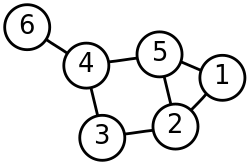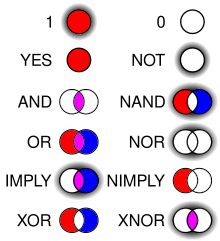

A proposition is a declarative sentence (that is, a sentence that declares a fact) that is either true or false, but not both.
Some propositions:
Some non-propositions:
DEFINITION 1:
Let p be a proposition. Then ¬p is the
negation of p. The truth value of ¬p is
T if p is false, and F if p is true.
Example:
If p is "All students will pass discrete
mathematics, then ¬p is "Not all students will
pass discrete mathematics."
| Truth table for negation | |
|---|---|
| p | ¬p |
| T | F |
| F | T |
DEFINITION 2:
Let p and q be propositions. The conjunction of p and q, denoted by p ∧ q, is the proposition "p and q." The conjunction p ∧ q is true when both p and q are true and is false otherwise.
Example:
If p is "It is raining," and q is "It is
sunny," then p ∧ q is "it is raining and
sunny."
| Truth table for conjunction of two propositions | ||
|---|---|---|
| p | q | p ∧ q |
| T | T | T |
| T | F | F |
| F | T | F |
| F | F | F |
DEFINITION 3:
Let p and q be propositions. The disjunction of p and q, denoted by p ∨ q, is the proposition "p or q." The disjunction p ∨ q is false when both p and q are false and is true otherwise.
Example:
If p is "It is raining," and q is "It is
sunny," then p ∨ q is "it is raining or
sunny."
| Truth table for disjunction of two propositions | ||
|---|---|---|
| p | q | p ∨ q |
| T | T | T |
| T | F | T |
| F | T | T |
| F | F | F |
DEFINITION 4:
Let p and q be propositions. The exclusive or of p and q, denoted by p ⨂ q, is the proposition that is true when exactly one of p and q is true and false otherwise.
Example:
If p is "It is night," and q is "It is
day," then p ⨂ q
is "it is either night or day."
| Truth table for xor of two propositions | ||
|---|---|---|
| p | q | p ⨂ q |
| T | T | F |
| T | F | T |
| F | T | T |
| F | F | F |
DEFINITION 5:
Let p and q be propositions. The conditional statement p ⇒ q is the proposition "if p, then q." The conditional statement p ⇒ q is false when p is true and q is false, and true otherwise. In the conditional statement p ⇒ q, p is called the hypothesis (or antecedent or premise) and q is called the conclusion (or consequence).
Some ways of expressing implication:
| Truth table for the conditional statement | ||
|---|---|---|
| p | q | p ⇒ q |
| T | T | T |
| T | F | F |
| F | T | T |
| F | F | T |
For p ⇒ q:
Of the above, only the contrapositive always has the same truth value as the original statement.
DEFINITION 6:
Let p and q be propositions. The biconditional statement p ⇔ q is the proposition "p if and only if q." The biconditional statement p ⇔ q is true when p and q have the same truth values, and is false otherwise. Biconditional statements are also called bi-implications.
Example:
The ponds freeze if and only if the temperature is below
32 F.
| Truth table for the biconditional statement | ||
|---|---|---|
| p | q | p ⇔ q |
| T | T | T |
| T | F | F |
| F | T | F |
| F | F | T |
| Truth table of (p ∨ ¬q) ⇒ (p ∧ q) | |||||
|---|---|---|---|---|---|
| p | q | ¬q | p ∨ ¬q | p ∧ q | (p ∨ ¬q) ⇒ (p ∧ q) |
| T | T | F | T | T | T |
| T | F | T | T | F | F |
| F | T | F | F | F | T |
| F | F | T | T | F | F |
| Precedence of Logical Operators | |
|---|---|
| Operator | Precedence |
| ¬ | 1 |
|
∧ ∨ |
2 3 |
|
⇒ ⇔ |
4 5 |
| Truth Value | Bit |
|---|---|
| T | 1 |
| F | 0 |
1. c; 2. a; 3. c; 4. d; 5. a; 6. d; 7. a;